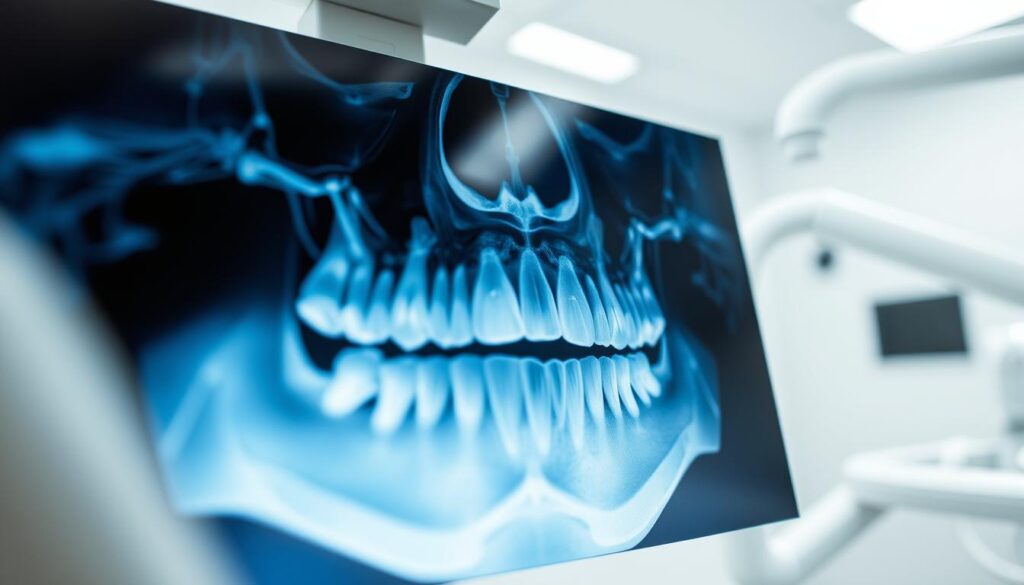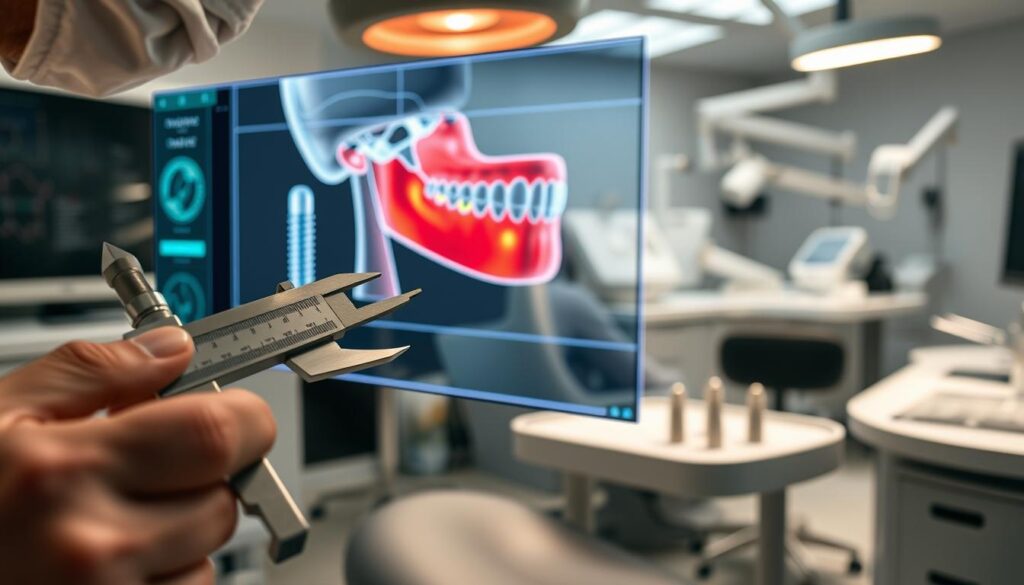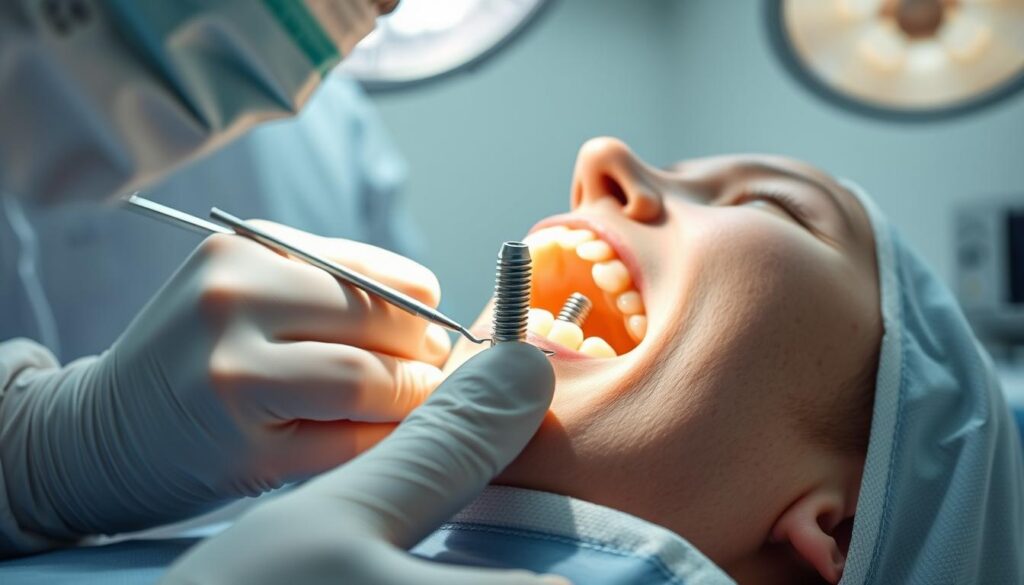Imagine if your dental implant was as unique as your fingerprint. Many think dental implants are all the same size and shape. But today’s dentistry offers much more than that. Your mouth, jaw, and teeth are special and deserve care that fits them perfectly.
Custom dental implants are a new way to replace teeth. They’re made just for you, using advanced 3D scans and precise making. Unlike regular implants, these are designed to fit your gums and teeth perfectly.
Choosing custom dental implants can make a big difference. With over 20 years of dental tech progress, places like VTA Dental Lab make implants from zirconia, titanium, and gold. Each one is made to match your tooth’s exact shape, for the best comfort and function.
Key Takeaways
- Customized dental implants are uniquely designed to match your individual oral anatomy
- Advanced 3D optical scanning creates precise measurements for perfect fit
- Materials include zirconia, titanium, and gold anodized options
- Personalized dental implants follow your original tooth structure
- Custom dental implants provide better comfort than standard alternatives
- Modern technology enables exact matching to gum and tissue contours
Understanding Dental Implants and Their Purpose
Dental implants are more than just a fix for missing teeth. They are a permanent solution that works with your body. Modern implant technology makes implants that fit each person’s unique needs and body shape.
What Are Dental Implants?
A dental implant has three main parts. The implant post acts as a fake tooth root, placed in the jawbone. An abutment connects to the post and goes through the gum. A custom crown then attaches to the abutment, making it look like a real tooth.
Each part is crucial for making implants that work like real teeth. The post keeps it stable, the abutment sets the right height and angle, and the crown adds beauty and function.
The Role of Titanium in Biocompatibility
Titanium is the top choice for implant posts because it’s safe for your body. It’s rare for people to have allergic reactions to titanium implants. Success rates for titanium implants are over 95%.
The metal lets bone cells attach to it, creating a strong bond. This bond, called osseointegration, keeps your implants stable for many years.
How Implants Restore Both Function and Aesthetics
Implants give you back your chewing power and keep your face looking right. The crown is made from materials like porcelain or ceramic, matching your other teeth. You can eat, talk, and smile without worry, knowing your teeth look and feel real.
The Dental Implant Process: From Consultation to Restoration
Creating bespoke dental implants begins with a detailed consultation. Your dentist checks your oral health and talks about what you want. They use advanced 3D imaging to scan your jaw.
This helps figure out if implants are right for you. It also shows if any extra steps are needed before the implants go in.
Before the implants, you might need to get teeth pulled or have bone grafting. Some people can get their implants the same day they lose a tooth. The dental implant process uses titanium posts that blend with your jawbone.
This process, called osseointegration, takes three to six months. Your jawbone cells grow around the implant, making it strong. Special tests check how well the implant is fitting in.
After it’s fully integrated, your dentist puts on custom crowns. These crowns are made to look just like your real teeth. They’re made with advanced technology to match your dental shape perfectly.
The end result is a smile that looks natural and teeth that work well. You can eat and smile like you used to.
Benefits of Choosing Customized Dental Implants
Customized implants offer big advantages over standard dental options. They fit your mouth perfectly, providing comfort and results that generic implants can’t. They look great and work better than basic tooth replacements.
Personalized Treatment Plans for Individual Needs
Every person’s dental needs are different. Your jaw, bone, and bite are unique. Custom implants and prosthesis are made just for you, thanks to advanced imaging.
- Irregular bone structures requiring special positioning
- Low bone density areas needing specific implant designs
- Complex bite patterns demanding precise alignment
Natural-Looking Results That Blend Seamlessly
Modern customized implants look amazing. They match your natural teeth perfectly. This makes your smile look natural and boosts your confidence.
Long-Term Oral Health Preservation
Custom dental solutions keep your mouth healthy for years. They help your jawbone stay strong and prevent bone loss. This means better support for your teeth and a healthier mouth.
Essential Pre-Surgery Considerations

Before getting personalized dental implants, several important factors need careful evaluation. Your dentist will conduct a thorough assessment to ensure the best possible outcome for your unique situation. This detailed planning phase helps create a treatment plan tailored specifically to your oral health needs.
Assessing Your Oral Health Status
Your overall oral health plays a vital role in determining your suitability for custom dental implants. Healthy gums free from periodontal disease provide the foundation for successful implant placement. Your dentist will examine your gums, remaining teeth, and oral tissues during your consultation.
Digital scans and X-rays reveal hidden issues that might affect your treatment. These advanced imaging tools help identify any underlying problems that need attention before proceeding with implant surgery.
Evaluating Jawbone Density Requirements
Adequate jawbone density is crucial for supporting custom dental implants. Your jaw needs sufficient bone volume to anchor the titanium posts securely. During your evaluation, your dentist will use 3D imaging to measure bone thickness and quality.
If bone loss has occurred, options like bone grafting can rebuild the necessary support structure. This preparatory procedure ensures your personalized dental implants have a solid foundation for long-term success.
Addressing Existing Dental Issues First
Any current dental problems require treatment before implant placement. Cavities, infections, or gum disease must be resolved to create a healthy environment for your new implants. Your dentist will develop a comprehensive treatment plan addressing these issues in the proper sequence.
Selecting the Right Dental Implant Material
Choosing the right material for tailored dental implants is key to a successful and beautiful smile. Each part of your implant needs a specific material based on your needs and oral health.
The implant post, your new tooth root, is made of titanium. This metal is strong and bonds well with your jawbone. Your dentist picks titanium for individualized dental implants because it’s safe for your body and lasts a long time.
Custom abutments link your implant post to the crown. They come in different materials:
- Titanium abutments – great for back teeth where strength is important
- Zirconium abutments – best for front teeth where looks count
- Gold anodized options – offer a warm look for certain aesthetic needs
The crown material choice for tailored dental implants depends on where it’s placed and what it does. Porcelain crowns look like real teeth. Ceramic ones resist stains and blend in with your teeth. Zirconia is strong and looks good in any spot.
Your dental expert considers many things when picking materials for individualized dental implants. They look at how hard you bite, the color of your teeth, and your budget. Front teeth get materials that look good, while back teeth need ones that last. This way, your implants look natural and work well for a long time.
Personalized Sizing for Optimal Comfort and Function

Creating perfectly fitted dental implants needs precise measurements and advanced technology. Every mouth is different, requiring special attention. Made-to-order dental implants consider your jaw structure, tooth spacing, and bite patterns for comfort and function.
Factors Determining Implant Size Selection
Several key elements affect the size of bespoke dental implants. Your dentist looks at many factors to find the perfect size:
- Jaw bone dimensions – The width and height of available bone structure
- Adjacent tooth spacing – The gap between neighboring teeth
- Bite force distribution – How pressure spreads across your teeth
- Gum tissue thickness – The amount of soft tissue surrounding the implant site
- Opposing tooth position – The location of teeth that will meet the implant
Age and overall health also play a role. Bone density assessment shows if more procedures are needed before implants.
The Role of 3D Imaging in Customization
Digital scanning technology changes how dentists make dental implants. Cone beam computed tomography (CBCT) creates detailed 3D images of your jaw. It shows bone density, nerve locations, and sinus positions accurately.
Computer-aided design software uses these scans to plan the best implant placement. This digital process lets dentists see the final result before surgery. It ensures implants fit perfectly in your mouth’s unique shape.
Tailored Treatment Plans by Experienced Professionals
Creating effective customized dental implants needs skilled professionals. They understand each patient’s specific needs. Experienced dental teams use advanced technology to develop personalized treatment strategies.
Modern treatment planning starts with virtual simulation technology. Dental professionals work closely with oral surgeons. They design customized implants using CAD/CAM software.
- Comprehensive oral health evaluation
- Discussion of patient preferences and lifestyle needs
- Review of all available implant options
- Creation of a detailed treatment timeline
- Cost analysis and financing planning
Leading dental practices like Aspen Dental provide complete care under one roof. Patients benefit from coordinated services without visiting multiple providers. This streamlined approach saves time and ensures consistent communication between team members throughout the treatment process.
Experienced clinicians carefully plan each procedure. They ensure safe and precise placement of customized implants. They consider factors like bone density requirements and healing times when developing treatment plans.
The combination of advanced technology and compassionate care makes modern implant treatment more predictable and comfortable than ever before. Patients receive clear explanations at every step. This helps them make informed decisions about their oral health.
The Surgical Placement and Healing Process

Getting personalized dental implants is a journey. It starts with a planned surgery and then healing. Your dentist will help you through each step, making sure you’re comfortable. Knowing what happens during surgery and recovery makes patients feel sure about their choice.
Local Anesthesia and Patient Comfort
The first step is local anesthesia to numb the area. Most people feel only a little pressure, not pain. If you’re nervous, your team might offer sedation.
After the surgery, any discomfort is usually mild. You can take over-the-counter pain meds like ibuprofen. Putting ice packs on your face can help with swelling in the first 24 hours.
Understanding Osseointegration
Osseointegration is when your jawbone grows around the titanium implant. This makes your new tooth very stable. The implant becomes part of your jaw, just like a natural tooth root.
Timeline for Complete Integration
The time it takes for implants to heal varies. Most people are fully healed in 3 to 6 months. Healing time depends on:
- How healthy your bone is
- Where the implant is in your mouth
- How fast your body heals
- Following your dentist’s care instructions
Your dentist will check on you regularly. They’ll wait until your implants are fully healed before putting on the final crown.
Custom Abutment and Crown Design
After your implant settles into your jawbone, the next step is creating the visible part of your tooth replacement. Custom dental implants need abutments and crowns that perfectly match your natural teeth. This careful process makes your new tooth look, feel, and work just like the one you lost.
The abutment connects your implant to the crown. Dental experts make these connectors from molds of your implant site. Your dentist takes detailed measurements of your mouth, capturing every contour of your gums and teeth. This ensures a perfect fit without needing many adjustments.
The crown is the visible tooth replacement on top of your abutment. Master technicians craft each crown to match several key features:
- Exact shape matching your original tooth
- Precise size coordination with adjacent teeth
- Color blending with surrounding natural teeth
- Surface texture mimicking enamel appearance
- Bite alignment for comfortable chewing
Whether you need a single tooth or multiple teeth restored, tailored dental implants offer seamless integration. Dental labs use advanced materials like porcelain and zirconia for crowns. These materials resist staining and wear. The final product fits your gum contours perfectly, making it easy to clean and preventing food trapping.
This personalized approach to crown and abutment design ensures your implant restoration enhances both your smile and oral function for years to come.
Post-Operative Care for Individualized Implants

Proper care after getting your individualized dental implants is key to healing and long-term use. Your healing starts right after surgery and goes on for the life of your implants. Following certain rules helps your implants fit well with your jawbone and stay healthy for years.
Immediate Recovery Guidelines
The first 72 hours after getting your implants are very important for healing. You might feel a bit sore, but this usually goes away in a few days. Rest is important—avoid hard activities for at least 48 hours.
Also, your diet needs to change. Eat soft foods like yogurt, applesauce, and warm soups. Cold foods can help with swelling. Avoid hot drinks, alcohol, and tobacco for now. Start gentle cleaning around the implant right away, but don’t touch the surgery area for a few days.
Long-Term Maintenance Requirements
After your implants heal, daily care is simple but important. Brush twice a day with a soft toothbrush and gentle toothpaste. Use a power flosser to clean around your implant crowns safely. Mouthwash helps protect against bacteria.
| Daily Care Task | Frequency | Special Considerations |
|---|---|---|
| Brushing | Twice daily | Use soft bristles, gentle circular motions |
| Flossing | Once daily | Water flossers recommended around implants |
| Mouthwash | Once daily | Alcohol-free antimicrobial formula preferred |
| Professional cleaning | Every 6 months | Specialized tools for implant surfaces |
Follow-Up Appointments and Monitoring
Regular dental visits are crucial for checking your implants. Your dentist will check how stable your implants are, look at your gums, and clean around your implants. Most people need to go every six months, but some might need to go more often.
At these visits, your dentist uses special tools for cleaning implants. They also take X-rays to check on your bone health. Many dental offices offer long warranties, up to 25 years, to help you feel secure about your implants.
Bespoke Solutions for Complex Cases
Patients with tough dental issues need customized dental implants that are not standard. These special treatments tackle unique body challenges. This includes odd bone shapes, big bone loss, and certain looks that regular implants can’t meet.
New implant techs now tackle cases once thought impossible. For those with too little jawbone, made-to-order dental implants bring new hope. They skip the need for big bone grafts.
- All-on-X systems that support an entire arch of replacement teeth using only four strategically placed implants
- Zygomatic implants that anchor directly into the cheekbone, bypassing severely resorbed upper jaw areas
- Pterygoid implants that utilize the pterygoid bone for strong posterior support
- Custom-angled abutments designed through CAD/CAM technology for optimal positioning
Creating customized dental implants uses top-notch planning tools and 3D images. These tools help dentists make implants that last and work well every day. Single-day implant solutions use CBCT scans and digital methods. This lets patients get their implants and teeth right away.
| Complex Case Type | Custom Solution | Key Benefits |
|---|---|---|
| Severe Upper Jaw Bone Loss | Zygomatic Implants | No bone grafting needed, immediate stability |
| Complete Arch Replacement | All-on-4 System | Fewer implants, reduced cost, same-day teeth |
| Posterior Maxilla Atrophy | Pterygoid Implants | Strong anchorage, avoids sinus lift surgery |
| Irregular Bone Anatomy | CAD/CAM Custom Abutments | Perfect fit, optimal aesthetics, improved function |
These made-to-order dental implants open new doors for patients with few options. Each one is made just right for the person’s body and needs. This leads to great results, even in the toughest cases.
Advanced Technology in Made-to-Order Implants
Modern dental practices now use advanced technology to make implants just for you. They use digital imaging, computer-aided design, and precise manufacturing. This means your implants will fit perfectly with your mouth’s unique shape.
Cutting-Edge Imaging and Planning Software
Digital technology has changed how dentists make implants and dentures. Advanced 3D optical scanning takes detailed pictures of your mouth. This creates a digital model for planning implant placement.
Computer software looks at bone density, nerve locations, and teeth positions. It also lets you see what your smile will look like before treatment. These tools help make surgery safer and more accurate.
Precision Manufacturing Techniques
CAD/CAM systems make patient-specific abutments with great precision. 3D printing technology creates customized implants from titanium and zirconia that fit your bone structure perfectly.
| Manufacturing Method | Accuracy Level | Production Time |
|---|---|---|
| 3D Printing | 0.1mm precision | 2-4 hours |
| CAD/CAM Milling | 0.05mm precision | 1-3 hours |
| Traditional Casting | 0.5mm precision | 2-3 days |
These methods make implants with special textures for better bone integration. Your implants will fit naturally and provide long-lasting stability and comfort.
Comparing Standard vs. Custom Dental Implants
Choosing between standard and custom dental implants is a big decision. It depends on your dental needs, what you want to look like, and how much you can spend. Both can replace missing teeth, but they are different in design, precision, and results. Knowing these differences helps you choose wisely for your teeth.
When Personalization Makes a Difference
Custom dental implants are best when standard ones don’t fit. They work great for people with unique jaw shapes, odd tooth spacing, or special looks they want. Studies show custom abutments fit better, with an average angle of 9.95 degrees, compared to 16.50 degrees for standard ones. This means they look and feel more natural.
For front teeth, where looks are everything, custom implants are key. They match your tooth color perfectly, have the right shape, and blend in with your other teeth. People with thin gums or high smile lines get the most from these implants because of their precision.
Cost-Benefit Analysis of Customization
Custom dental implants cost more upfront because of advanced tech like 3D imaging and CAD/CAM. But, they often save money in the long run. They fit better, need fewer adjustments, and last longer.
| Feature | Standard Implants | Custom Implants |
|---|---|---|
| Initial Cost | $1,500-$3,000 | $3,500-$6,000 |
| Production Time | 2-4 weeks | 4-8 weeks |
| Fit Precision | Good | Excellent |
| Aesthetic Results | Satisfactory | Superior |
| Average Lifespan | 10-15 years | 15-25 years |
Custom dental implants usually last longer and make patients happier. They are more comfortable, have fewer risks, and look better. For many, the extra cost is worth it for a lasting smile.
Lifestyle Benefits of Personalized Dental Implants
Missing teeth can change your life in many ways. Tailored dental implants are more than just a fix. They let you live life fully, without feeling self-conscious.
One big plus is eating your favorite foods without worry. Unlike dentures, implants don’t slip. So, you can enjoy apples, steak, and corn on the cob without fear.
These custom implants also make your smile and speech better. People with missing teeth often struggle to speak clearly. But implants fix this, letting you laugh and speak freely.
They also help keep your face looking good. Natural teeth roots keep the jawbone strong. Without them, your face can look sunken. Implants keep your jaw healthy, keeping your face looking young.
| Daily Activity | With Missing Teeth | With Dental Implants |
|---|---|---|
| Eating | Limited food choices | Enjoy all foods |
| Speaking | Possible slurring | Clear pronunciation |
| Smiling | Self-conscious | Confident expression |
| Maintenance | Daily adhesives | Regular brushing only |
Best of all, implants feel like your own teeth. There’s no need to get used to them. They just feel like part of you, needing only regular care.
Finding the Right Provider for Your Unique Needs
Choosing the right dental professional for your bespoke dental implants is crucial. Your choice affects the success of your treatment and your satisfaction with your new smile. The skill of your implant specialist is key to getting results that fit your specific needs.
Questions to Ask Your Dental Implant Specialist
At your consultation, have important questions ready. Ask about their success rates, which should be over 95%. Also, ask about warranties for the implant and the restoration work.
- How many implant procedures have you performed?
- Do you offer comprehensive care in one location?
- What financing options are available for treatment?
- Can you provide before-and-after photos of similar cases?
- What type of warranty coverage do you offer?
Evaluating Experience and Technology
Seek providers with lots of experience in bespoke dental implants. VTA Dental Lab, for example, has over 20 years of experience with complex cases. Modern technology boosts precision and success. Make sure your provider uses:
- 3D scanning for accurate impressions
- CAD/CAM technology for precise implant design
- Digital surgical planning software
- High-resolution imaging equipment
Places like Aspen Dental offer all services under one roof. This means you don’t have to see multiple specialists. It makes your dental implants journey smoother and more coordinated.
Conclusion
Customized dental implants are a big step forward in dental care. They are made just for you, fitting perfectly and looking great. This makes your smile better and makes everyday life easier.
The tech behind customized dental implants makes them super comfy and natural-looking. They blend in with your teeth like they were always there.
Getting customized dental implants does more than just fix a tooth. They help keep your jawbone strong and your face looking right. They also protect your other teeth from moving.
With the right care, these implants can last a very long time. This means you won’t have to worry about them breaking down soon. It’s a smart choice for your health and your wallet.
Starting your smile journey is easy. Just talk to a skilled dentist who can see what you need. They use special tools and plans to make sure your implants fit you perfectly.
Whether you need one tooth or a whole mouth fixed, these implants can help. They give you the confidence and function you want for many years.
